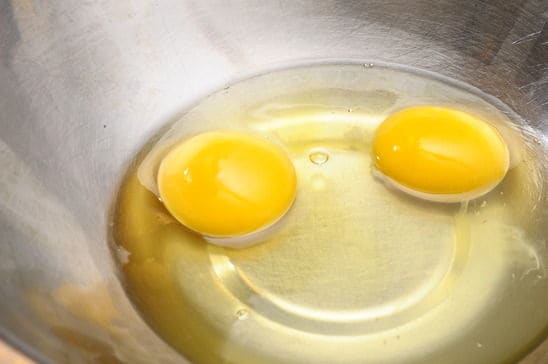

When I was a much younger man I embarked on a mission to improve my body and maximize my health through nutrition and exercise. Part of that journey was reading everything I could get my hands on to learn how to best feed myself. In the course of that self-education I became indoctrinated to the “fact” of the health risks of eating eggs. Actually, the white was always considered fine; it was the yolk that could kill you. I bought into it, reluctantly, because even though I loved eggs, the experts were telling me that I was destined for heart disease if I ate these things. Even so, every time I discarded a creamy, orange yolk en route to my egg white omelet I wondered why nature would make such a delicious, nutritious food unhealthy.
Then, I went back to school and, as I learned about how the human body works, some long-held beliefs began to come into question. One of those “truths” that was debunked, in my mind, was the cholesterol-elevating effect of egg yolk consumption. Lacking any other information besides the facts of human physiology and my beliefs about natural foods I eagerly brought the wrongly accused whole egg back into my life. Over the years, this prompted many a debate with friends and other health professionals – but I stuck to my guiding principle of nutrition: “The closer it is to nature, the better it is for you.” It doesn’t get any closer than the egg.
To ease any doubts and bolster my argument I fueled my beliefs with some research and was impressed by this little yellow dynamo of nutrition. Here’s a rundown on just what you’re missing when you eschew the yolk:
- Essential Fatty Acids: 100%
- Vitamins A, E, D, K: 100%
- Carotenoids: 100%
- Calcium, iron, phosphorus, zinc, thiamin, pantothenic acid, B6, folate, B12: 90% +
- Copper, manganese, selenium: 60% +
- Protein: 43%
Of the nutrients found in an egg, only potassium, magnesium, sodium and niacin are found in significantly higher concentrations in the white. As with most cholesterol-rich foods, the egg yolk is replete with important nutrients. This begs the question: “How can eggs be bad for you?”According to new research, they’re probably not.
As part of the Helena study, which was performed in nine countries, 380 adolescents were studied to measure the effect of egg consumption on cardiovascular health. The verdict: “Egg intake was not associated with lipid profile, adiposity, insulin resistance, blood pressure, cardiorespiratory fitness or the integrated CVD risk score. This lack of association was not influenced by physical activity.”
This finding supports an earlier study performed at the University of Connecticut which concluded that egg consumption had an overall positive effect on blood lipid profile. In addition, the UConn study indicates that eating whole eggs has a positive effect on insulin resistance and metabolic syndrome. Another study performed at Harvard School of Public Health found no evidence of association between dietary whole eggs and cardiovascular disease risk. These studies concur in the recommendation of one egg per day as a safe level of consumption. Clearly, for egg lovers like me this is wonderful news, but it should serve to encourage all omnivores to relax and welcome the egg yolk back into their Sunday omelet. Enjoy!





This is good news, because I eat scrambled eggs for breakfast on most mornings!